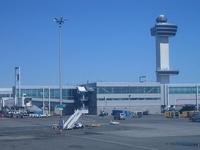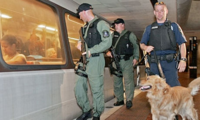-
White House to take a second look at FAA furloughs

The White House hinted Wednesday that it could accept legislation which would end Federal Aviation Administration (FAA) furloughs. Passengers have been in arms over lengthening flight delays and a growing number of flight cancellations, while GOP lawmakers accused the FAA of implementing the sequester-mandated budget cut in such a way so as to cause maximum inconvenience to passengers.
-
-
Gay rights advocates want immigration reform bill to recognize gay couples
Gay rights advocates are campaigning for changes in the bi-partisan Senate immigration overhaul bill so that it would include homosexual couples. Democrats, however, are being cautious, fearing that adding a reference to gay couples would cause many GOP lawmakers to reject the bill.
-
-
Atlanta losing DHS area security grant money
The city of Atlanta is losing DHS grant money used to strengthen the city’s ability to protect against a terrorist attack. Despite being home to recent high profile events such as the NCAA’s Final Four, federal records show the amount of money allocated to Atlanta through urban area security grants has dropped from $13 million in 2010 to $5 million last year.
-
-
Office implementing Obamacare avoids furloughs
Gary Cohen, the director of the Center for Consumer Information and Insurance Oversight, said Wednesday that his office will not be furloughing its workers due to the federal budget cuts known as the sequester. His office is in charge of implementing most of President Obama’s healthcare law.
-
-
EPA slams State Department’s Keystone XL pipeline review
The Environmental Protection Agency (EPA) on Monday criticized the State Department’s environmental impact review of the Keystone XL pipeline, saying there was not enough evidence to back up key conclusions in the review on emissions, safety, and alternative routes. The EPA’s comments could have a negative effect on the approval of the project, but if the project is approved, the comments could serve as supporting evidence in any ligation against the pipeline.
-
-
Dzhokhar Tsarnaev had no firearms, explosives with him when captured
More details have emerged to shed light on the last few hours before 19-year old Dzhokhar Tsarnaev was captured hiding on a boat in Watertown, Massachusetts. Tsarnaev had no weapons or explosives with him in the boat where he was hiding. Boston police officers say that the heavy fire directed at the boat was probably the result of chaos of the moment. In a tense and charged atmosphere, one accidental shot could have caused what police call “contagious fire.” Tsarnaev sustained severe injuries, some of them to his neck and lower jaw, preventing him from talking. This led to rumors in the press that he tried to take his own life, but failed. We now know that he could not have tried to take his life because he had no firearms with him on the boat.
-
-
Experts: security of U.S. mass transit system must be tightened

Counterterrorism experts are arguing that security on America’s mass transit lines must be tightened in light of the foiled plot to attack a Toronto passenger train. The plan to attack Canada’s transit system highlights security holes in America’s commuter system, and the challenges involved in securing this vast system.
-
-
Lawmakers question Napolitano on border-security measurement methods
Senators Tuesday grilled DHS secretary Janet Napolitano on what methods her department will use to provide a “meaningful” border-security measurement, which is a key condition for implementing a bipartisan immigration reform legislation unveiled last week.
-
-
McCaul to draft cybersecurity bill
House Homeland Security chairman Michael McCaul (R-Texas) said he was drafting his own cybersecurity bill, which will define the role of DHS in sharing information with private companies about cyber threats. McCaul hopes to agree on a compromise with the White House, which threatened to veto the bill.
-
-
Reactions to Boston bombing threaten passage of immigration reform
Reactions to the Boston Marathon bombings could become threaten the passage of immigration reform in Congress. Conservative Republicans who oppose an immigration reform along the lines offered by the bipartisan Gang of Eight have spoken out on the Hill, talk radio, and social networks saying that the bill should be reconsidered in light of the fact that the suspects were born outside the United States.
-
-
U.S. hospitals shipping sick immigrants back to their home countries

Hundreds of immigrants who are in the United States illegally end up in the hospital only to find out they will be sent home through a removal system run by hospitals trying to avoid the high cost of treating illegal immigrants.
-
-
TSA reverses course on knives-on-planes policy
The Transportation Security Administration (TSA) has abandoned, for now, its proposal to allow travelers to carry small knives on airplanes owing to significant opposition from lawmakers, air marshals, law enforcement officials, and flight attendants.
-
-
U.S., China in high-level military talks
Representatives of China and the United States met on Monday for the highest-level military talks between the two counties in almost two years. In the meeting, a senior Chinese general pledged to work with the United States on cybersecurity because the effects of a major cyber attack “may be as serious as a nuclear bomb.”
-
-
Lawmaker wants to give FBI more power to track terror suspects

In 2011, at the request of Russia, the FBI questioned Tamerlan Tsatnaev to see whether he was affiliated with Chechen Islamic terrorist networks. The FBI’s investigation did not find anything, and his case was dropped. In the months following the questioning, Tsarnaev adopted more radical views, and gave expression to his militant views on his Facebook page. Even though his name was already in the FBI’s files, the agency’s ability to continue tracking him was limited by law. Senator Lindsey Graham (R-South Carolina) wants Congress to see whether the FBI’s authority to track extremist activity in the United States should be expanded.
-
-
N.Y. lawmakers oppose proposed hikes in U.S.-Canada border crossing fees
The U.S. government is considering charging a new fee for every vehicle or pedestrian crossing the U.S.–Canada border. This has upset lawmakers in New York who argue the toll would hurt trans-boundary commerce and undermine efforts to ease the flow of traffic and goods between the two countries. Moreover they suggest that the real purpose of the proposed fees is to subsidize the more expensive security operations along the U.S.-Mexico border.
-
More headlines
The long view
Preventing Another 'Jan. 6' Starts by Changing How Elections Are Certified, Experts Say
The 2024 presidential election may be a rematch between President Joe Biden and former President Donald Trump, but preventing a repeat of Jan. 6, 2021 — when false claims of a stolen election promoted by Donald Trump and his allies led to an insurrection at the U.S. Capitol —will be top of mind this election year. Research finds broad support among public for nonpartisan certification commissions.
States Rush to Combat AI Threat to Elections
This year’s presidential election will be the first since generative AI became widely available. That’s raising fears that millions of voters could be deceived by a barrage of political deepfakes. Congress has done little to address the issue, but states are moving aggressively to respond — though questions remain about how effective any new measures to combat AI-created disinformation will be.
Chinese Government Hackers Targeted Critics of China, U.S. Businesses and Politicians
An indictment was unsealed Monday charging seven nationals of the People’s Republic of China (PRC) with conspiracy to commit computer intrusions and conspiracy to commit wire fraud for their involvement in a PRC-based hacking group that spent approximately 14 years targeting U.S. and foreign critics, businesses, and political officials in furtherance of the PRC’s economic espionage and foreign intelligence objectives.
European Arms Imports Nearly Double, U.S. and French Exports Rise, and Russian Exports Fall Sharply
States in Europe almost doubled their imports of major arms (+94 per cent) between 2014–18 and 2019–23. The United States increased its arms exports by 17 per cent between 2014–18 and 2019–23, while Russia’s arms exports halved. Russia was for the first time the third largest arms exporter, falling just behind France.
LNG Exports Have Had No Impact on Domestic Energy Costs: Analysis
U.S. liquified natural gas (LNG) exports have not had any sustained and significant direct impact on U.S. natural gas prices and have, in fact, spurred production and productivity gains, which contribute to downward pressure on domestic prices.
